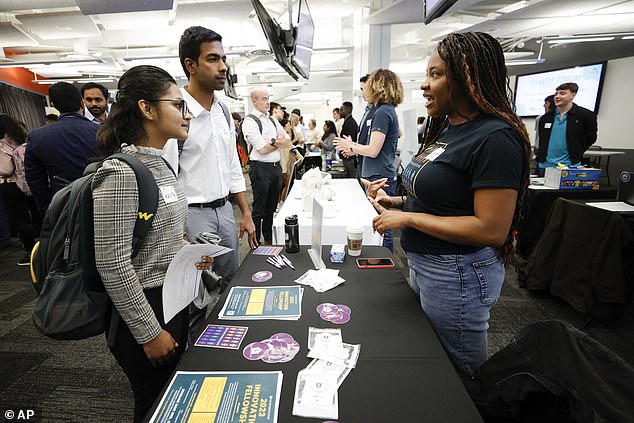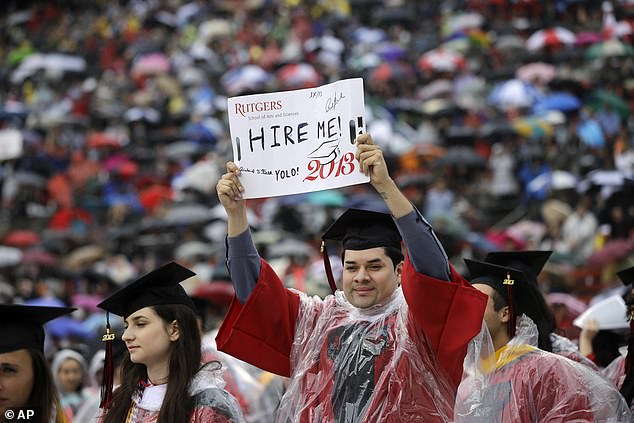Desperate college students entering the workforce are the latest victims of scams with fake job recruiters promising lucrative careers and deceiving them.
The newest trick is for scammers to approach job seekers with promises of high-paying work. Scammers even pretend to be professors or have ties to the university, authorities warn.
They then trick the student into accepting a check, which bounces, but not before the scammers gain access to the victim’s bank account, allowing them to flee with their money.
“I feel ashamed,” TikToker D. Cain said in a video detailing how he was victimized. ‘It happened to me. It could happen to you.’
Desperate college students entering the workforce are the latest victims of scams with fake job recruiters promising lucrative careers and deceiving them. The scam has grown so big that numerous videos on social media discuss the problem or detail how they fell victim.

Scams have become so common that the Federal Trade Commission has issued warnings about them.
Scams have become so common that the Federal Trade Commission has issued warnings about them.
In its statement, the FTC noted that scammers “may send emails that appear to be from someone in your community, such as a professor or an office at your university.”
The FTC went on to describe how the scam worked: ‘If you apply, they will mail you a check to deposit into your bank. They will then ask you to send some of the money to another account.
‘They tell you a convincing story, but the check is fake and the whole thing is a scam. The check will eventually bounce and the bank will want you to return the money you withdrew. In the meantime, the scammer will be gone with the money you sent them.’
The FTC’s horrific account of the scam echoes the experiences of many college students and graduates who have been successfully deceived by bogus recruiters.
Cody Querubin, a senior at George Mason University, received an email in his student account in February about a data analyst internship.
The sender address was careers@veollawatertech.com. There is a legitimate company name, Veolia Water Technologies & Solutions, that the scammers were trying to impersonate.
After expressing interest, Querubin participated in an interview hosted on Microsoft Teams. But he didn’t see the recruiters’ faces and the interview was conducted via chat, something that, in retrospect, Querubin recognizes as a red flag.

Recent college graduates are desperate to find work, making them especially susceptible targets for scams.

As the job market tightens (it’s already tougher than last year), new college graduates are desperate to find work and are letting their guard down as a result.
At the end of the interview, the college senior was offered a remote job and sent a check to pay for a work laptop and company software.
The next day, he was told to send the money to a provider using Apple Pay or Zelle. Realizing something was wrong, Queubin alerted the bank about him, but it was too late. The check had bounced and he lost $1,745.
“I was really frustrated and just angry,” Querubin told the Wall Street Journal.
Erin McGoff, a popular TikToker, posted a video on her account to raise awareness about the ubiquity of job recruitment scams.
In the video, McGoff smiles as words appear on the screen that read: ‘A recruiter approaches a job, yes!’
Then the text says: ‘They say you don’t need to interview, they already want to hire you.’
The last block of text says: ‘The company does not have a website, it requests personal information and to cash a check they send you.’
She looks at the camera with a bewildered expression.
The TikTok has the legend: ‘ESTFA. There are so many scams out there right now. Be attentive.’

“I feel ashamed,” TikToker D. Cain said in a video detailing how he was victimized. ‘It happened to me. It could happen to you’

In 2017, the FBI issued a warning, telling young applicants to be careful when it comes to opportunities that exaggerate claims of potential earnings or earnings.
Recent college graduates are desperate to find work, making them especially susceptible targets for scams.
They are also very comfortable leading their lives online and have comparatively little experience when it comes to the job market.
As the job market tightens (it’s already tougher than last year), new college graduates are desperate to find work and are letting their guard down as a result.
The number of job recruitment scams reached a new level last summer, but they have continued to proliferate.
For years, federal investigators have been urging the public to be cautious when it comes to applying for jobs online.
In 2017, the FBI issued a warning, telling young applicants to be careful when it comes to opportunities that exaggerate claims of potential earnings or benefits. Many universities across the country have also alerted their graduates about the scams with websites detailing how they work and how to avoid falling victim.
“If you are asked to use your own money to get a job, there is a good chance it is a scam,” the University of Washington told its students.
“Please note that these scams are carried out through various forms of communication, including text messages, phone calls, email, including University of Washington email accounts, and social media messages.”

